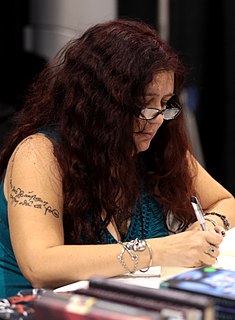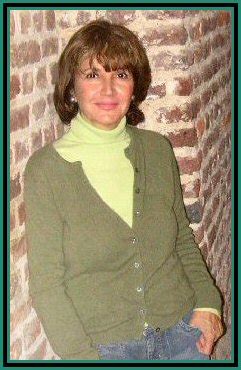A Quote by Melissa Marr
She was afraid, but she couldn't just sit around waiting for someone to save her. She had to try to save herself, try to figure it out.
Related Quotes
As he was about to leave, she said, "Murtagh." He paused and turned to regard her. She hesitated for a moment, then mustered her courage and said, "Why?" She though he understood her meaning: Why her? Why save her, and now why try to rescue her? She had guessed at the answer, but she wanted to hear him say it. He stared at her for the longest while, and then, in a low, hard voice, he said, "You know why.
She emptied herself of Fabio and of herself, of all the useless efforts she had made to get where she was and find nothing there. With detached curiosity she observed the rebirth of her weaknesses, her obsessions. This time she would let them decide, since she hadn't been able to do anything anyway. Against certain parts of yourself you remain powerless, she said to herself, as she regressed pleasurably to the time when she was a girl.
I found her lying on her stomach, her hind legs stretched out straight, and her front feet folded back under her chest. She had laid her head on his grave. I saw the trail where she had dragged herself through the leaves. The way she lay there, I thought she was alive. I called her name. She made no movement. With the last ounce of strength in her body, she had dragged herself to the grave of Old Dan.
She stared at herself in the mirror. Her eyes were dark, almost black, filled with pain. She'd let someone do that to her. She'd known all along she felt things too deeply. She became attached. She didn't want a lover who could walk away from her, because she could never do that - love someone completely and survive intact if her left her.
She had witnessed the world's most beautiful things, and allowed herself to grow old and unlovely. She had felt the heat of a leviathan's roar, and the warmth within a cat's paw. She had conversed with the wind and had wiped soldier's tears. She had made people see, she'd seen herself in the sea. Butterflies had landed on her wrists, she had planted trees. She had loved, and let love go. So she smiled.
There was once a little girl who was so very intelligent that her parents feared that she would die. But an aged aunt, who had crossed the Atlantic in a sailing-vessel, said, 'My dears, let her marry the first man she falls in love with, and she will make such a fool of herself that it will probably save her life.
I can never be who I was. I can simply watch her with sympathy, understanding, and some measure of awe. There she goes, backpack on, headed for the subway or the airport. She did her best with her eyeliner. She learned a new word she wants to try out on you. She is ambling along. She is looking for it.
She said that by introducing me to all these great things, Mary Elizabeth gained a “superior position” that she wouldn’t need if she was confident about herself. She also said that people who try to control situations all the time are afraid that if they don’t, nothing will work out the way they want.
Yet there were times when he did love her with all the kindness she demanded, and how was she to know what were those times? Alone she raged against his cheerfulness and put herself at the mercy of her own love and longed to be free of it because it made her less than he and dependent on him. But how could she be free of chains she had put upon herself? Her soul was all tempest. The dreams she had once had of her life were dead. She was in prison in the house. And yet who was her jailer except herself?


































